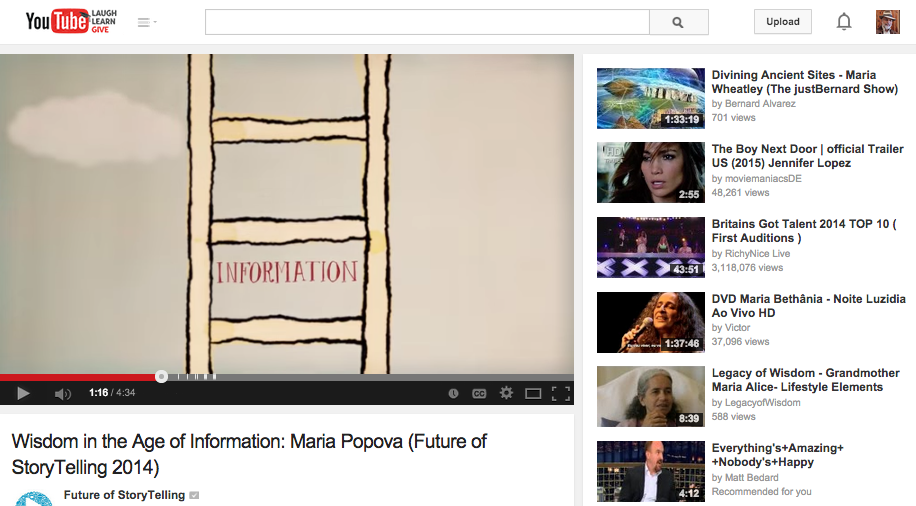Overall, I like the message of the
four-minute video “Wisdom
in the Age of Information” and resonate with Maria Popova’s lines like: “The great storyteller
is the kindly captain who sails her ship with tremendous wisdom and boundless
courage, who points its nose in the direction of horizons and worlds chosen with
unflinching idealism and integrity.” Check out this Future of StoryTelling's video.
But—you
knew there was going to be a “but” didn’t you, or there wouldn’t be a blog. No
one, no story, says it all. We need the dialog of voices; the
dissonance of honest conversation speaks true in our quantum age of
multiplicity. So perhaps I should say “and” instead of “but”; or better yet, we
might make up a word like “butand.”
My
reaction comes in my sense that situating wisdom atop a ladder with information
as the base is missing something. Like
Resonance. Popova's video references direction as North-South-East-West. What about
those authentic other ways known to native peoples like up, down, and inner.
Those directions are not found in data.
The
Age of Information works on the scientific method with its assertions of
supposedly generalizable conclusions, and the subsequent transfer of “facts,”
that is, information. We need storytellers for the Quantum Age where travelers
at the edge of consciousness might need facts butand also feel (and that
includes suffer as well as thrill) the loss of significant meaning. For at
least a hundred years, the search for destiny has been looking for guides who
acknowledge the validity found in quantum
discovery: uncertainty and
indeterminacy.
The
compass for today’s age gets forged in developing inner sense, and even the old
old stories tell it. For example,
I vibrate on the strings of the search told by Rumi (~1250) about the “Lost
Camel” (Mathnawi, Book 2, beginning about line 2970, depending on the
translation) where the time spent in imitation gets acknowledged and then
surpassed. The search is not straight-line, not directed by information; but it’s
made meanderingly, yet true to passion, inner vision, companionship as well as
individual integrity.
Destiny
doesn’t drop on persons who sit (like grad students choosing the back row) and
wait to be titillated by a bit of information, drugged by the thrill-a-minute
entertainment culture, and motivated by the get-off-your-butt video/movie/blog…
The Information-Ager might catch a cruise ship with 24-hour entertainment and
might even make center-stage on it. Butand that age no longer commands my quest
and it doesn’t reflect the base of the storytelling I care about.
A
ladder doesn’t seem to fit the quantum age. It’s too linear, too authoritarian,
too presumptuous. I like Rilke’s poem of the ancient
tower with
circling spirals and uncertainty of whether I’m a hawk, a tempest, a story, butand
a horserider. “Horserider” makes a special translation of the poem because it’s
where my resonant field intersects. A good story makes a space that opens for
the participant to enter, to make a telling translation. The telling gives a
reading of the magnetic field that rights destiny.
In
the field of terms needed for storytelling that trues our lives, I value experience,
resonance, and circling destiny. Good stories locate the space that often
grumbles “Nonsense!” The quantum storymaker turns the edge of consciousness
from nonsense toward “not-yet-sense” by playing resonance into the scent. This
play builds a feel of fit, butand it’s not a steady state. It’s a balancing
act, like centered riding with a magnificent horse.
Legacy says: Not-yet-sense is good focus for Good Stories. She imparted this affirmation in our time together this week by giving a movement that boggled my system. She offered a strange bump in the midst of our ride and it just didn’t compute. In other words, we entered the mist of nonsense. I was muddled with uncertainty: Had I just felt a half-hearted buck? Butand, might we have made an inarticulate shift toward a higher-level position?
Given
the context described above related to Good Stories, I interpret Legacy’s message
as affirmation of not-yet-sense. That’s helpful because it’s difficult to
engage positively with experience that doesn’t flow into meaning. Yet sometimes
the space to create new meaning, especially advancing consciousness, simply
needs holding until the wiring adjusts to different frequencies. The shout “Nonsense!”
offers a convenient escape hatch from the discomfort of developing. That’s
dangerous if we take nonsense as a turn-off or run-away signal rather than
possibly as hold-on-here.
Breathing
into dissonance instead of bolting or shutting down takes courage, patient
courage not the heroic kind. In our Good Story this week, the much-needed
development of feminine leadership depended on suffering the still point. It
extends our first Good Story, “Visit,” when the Old Woman made Ivan into a pin
and stuck him on the wall, a still point needed to get the direction necessary
to continue the quest for the Beloved. In this week’s “Golden Water,” the
character had to stay in a hut just outside the holy place and endure the
criticism of the masses for a long time. Our inner as well as outer critics may
fuss loudly when we take the time needed to integrate developing sensitivity. Dragnet
still sounds: “Just the facts, ma’am.” Significant advances in evolution have
taken centuries, but a year’s internship may sound intolerable to us.
The
Information Age supported many advances; butand it also risked loss of certain
kinds of knowing. The world of stories creates a category of “nonsense tales.”
Some storytellers, especially ones in an information age, require a stated
moral, and some versions make a nonsense tale into silly entertainment. Others,
perhaps ones sensitive to a quantum age, hold a space for nonsense to transform
into not-yet-sense with generative capacity to support voyagers at the quantum
edge of consciousness.


No comments:
Post a Comment